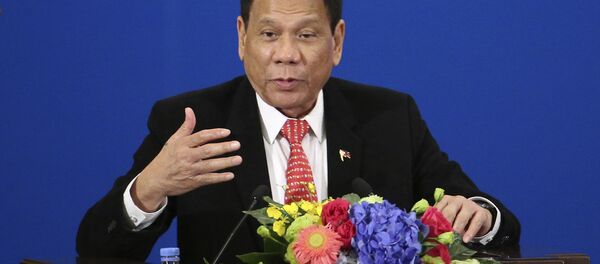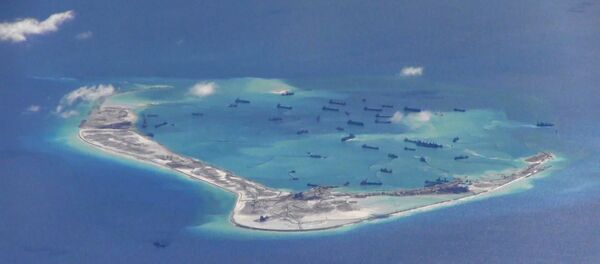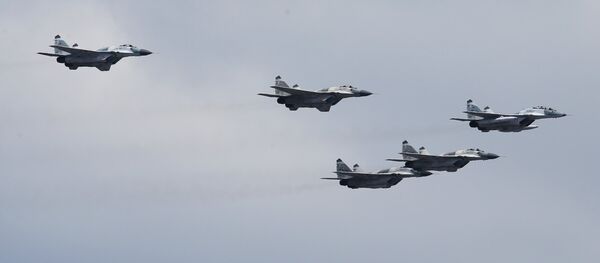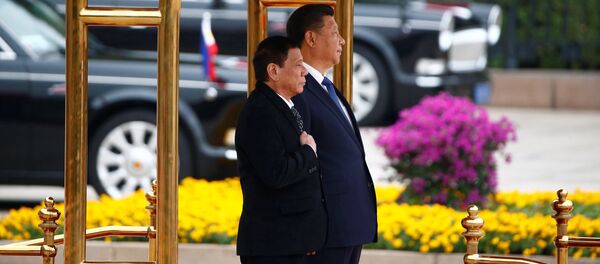On Thursday, the outspoken leader of the Southeast Asian country announced that he would be "separating" from the US to realign with China and Russia. "Your honors, in this venue, I announce my separation from the United States… both in military, but also economics," Duterte said, speaking before Chinese officials during his official state visit to Beijing.
"I've realigned myself in your ideological flow," the president later added, suggesting that "maybe I will also go to Russia to talk to [Russian President Vladimir] Putin and tell him that there are three of us against the world – China, the Philippines and Russia."
On Saturday, Duterte walked his words back a bit, insisting that his proposed geopolitical pivot is "not severance of ties" with Washington. "I said separation – what I was really saying was separation of foreign policy," the president stressed.
The Philippines were transfered from Spanish to US colonial rule in 1898 before being granted independence in 1946, following an arduous fight against Japanese occupation in WWII; despite this, the US maintained bases in the country.
Since taking office in May, Duterte has repeatedly made front page headlines, mostly for his salty language in describing world leaders, including US President Barack Obama. But it is the geopolitical implications of Duterte's remarks that are of greatest significance to Russian policy experts, who are split in their assessment.
Yuri Tavrovsky, Asia expert and professor at the People's Friendship University of Russia, told Sputnik that foul language aside, Duterte could not but evoke sympathy from ordinary people, both in his home country and throughout the developing world.
"Some say that he is a nationalist, others, that he is a patriot. Duterte, relying on the fact that he was elected president of the Filipino people, defends the national interests of the Philippines as he sees fit," the analyst suggested.
Tavrovsky stressed that before observers judge the 'maverick' president, they should consider the situation on the ground from his perspective. "The US has put the Philippines on the brink of war with China. Can you imagine the [disparity in] size? China, with its powerful military potential, and the Philippines, with three rusty destroyers…"
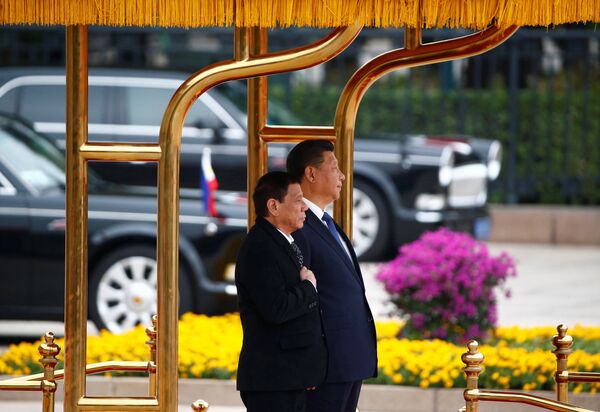
"The decision of the Court of Arbitration over the islands in the South China Sea and other decisions are pushing the Philippines into a confrontation [with Beijing]. The US is telling them to stand up for their interests – and that they will support them. However, whether or not they actually do so remains unclear. Leading his country into a war with China would be an absolutely senseless and criminal thing to do," the analyst noted.
"We know that Washington is lenient toward the drug trade – it's enough to recall Afghanistan and Colombia. Duterte has decided to defend the interests of his country, but the US is unhappy. And everyone knows what this discontent lead to. Moreover, the Philippines has a huge pro-American base; with the help of the US, these forces can break the independent president – hence his search for strong support" from among the population.
Ultimately, the analyst suggested that Duterte's Beijing visit, and his statements, can be chalked down to a desire to avoid a military and diplomatic collision with Beijing, but also secure rights for his country's fishermen, whose access to parts of the South China Sea has been restricted. "The Chinese, of course, will accommodate him, if Manila does not raise the question of sovereignty over these islands. But the main thing is the political and military 'roof'" Beijing can provide over Duterte's head.
As for the existing agreements on cooperation with the US, Manila isn't likely to abrogate them, either, Tavrovsky explained. "Duterte is not an idealist; therefore he says that he does not want to break existing agreements with the US. He will attempt to wear two hats…"
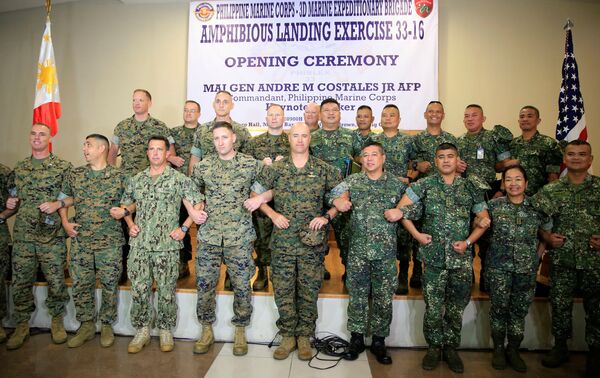
As for the prospects for Russian-Philippines cooperation, Ekaterina Koldunova, senior expert at the ASEAN Center of the Moscow State institute of International Relations (MGIMO), told Sputnik that Russia "should use every opportunity to expand its cooperation with the countries of Southeast Asia."
"Therefore, it's necessary to communicate with the president of the Philippines, and to establish greater interaction. If, as he says, he wants to diversify economic ties via closer dialogue with China and Russia, in the areas of telecommunications, logistics, infrastructure, it would be a sin not to use this opportunity," the analyst noted.
Koldunova stressed that Russian-Philippines ties in the areas of education, cultural exchange, agriculture and energy hold a great deal of potential. "The Philippines have talked for a long time about the idea of a gas hub, but the proposal has not moved forward from there; the strategic and military alliance with the US slowed these processes, and further discussions on friendly relations did not continue, despite the fact that in the economic sphere, there is nothing preventing us from expanded cooperation."
Speaking to the online newspaper Svobodnaya Pressa, Efimova explained that "if the tilt toward China is too strong, Chinese influence will steamroll the Philippines; and that too would not be good for the country."
Accordingly, the analyst noted, Manila needs Beijing to serve as a counterbalance to US influence — "so that Washington does not turn up its nose, and agrees to concessions when it comes to financing, investment and diplomatic curtseys toward the Philippines. Filipinos are sick of their status as the 'unsinkable aircraft carrier' of the US…They want the Americans to properly ask them and offer something worthwhile in return" for cooperation.
As for cooperation with Russia, including Duterte's remarks about economic or even military cooperation with Moscow, Efimova emphasized that "from Manila's point of view, it would be very good to have a third great power in the region. The more great powers there are, the easier it is to maneuver between them. These statements by Duterte were well-thought out…This is a great game which would ultimately benefit the country."
In any case, Efimova suggested Duterte, even if he is genuinely interested in pivoting away from Washington, has every reason to be apprehensive, since the country's army, and much of the elite, are under US influence, effectively putting the president in a situation where he is attempting to "balance on a knife's edge." "I think that he knows what he's doing, and will not bring the country to a situation where a coup or impeachment takes place," the expert concluded.


